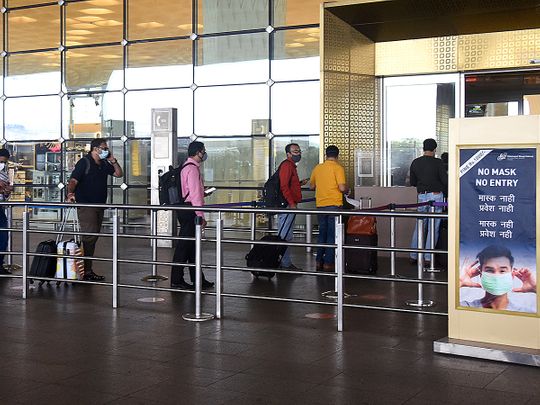
Dubai: India’s airlines are cancelling flights on their domestic routes after more states impose stricter restrictions in response to the rise in Omicron cases.
Earlier this week, India’s largest low-cost airline – Indigo – said it expects to cancel around 20 per cent of its scheduled operations. “Large numbers of IndiGo customers are changing their travel plans (because of Omicron),” the airline said in a statement. “With the reduced demand, we will also be selectively withdrawing.”
Due to customers reconsidering travel plans, Air India began offering a free change of date, flight number or sector for all domestic ticket holders with confirmed travel on or before March 31. Industry sources said the measures adopted by certain states have been further denting passenger confidence.
Kolkata airport, India’s fifth busiest air hub, is allowing domestic flights from Mumbai and New Delhi only thrice a week. “It’s like having your car, but you can only take it out on Monday, Wednesday and Friday,” said Satyendra Pandey, Managing Director at AT-TV. “You effectively have to plan your whole time-table. Operationally, it’s a mess, but they are working through it now.
“Next month or so is going to be pretty challenging as this virus spreads. Then it should fizzle out.” The aviation expert said international travel to India was hit to a lesser extent. “The folks that are traveling are the ones who really have to travel,” he added. “In that sense, there is no impact to demand - leisure demand was already very low.”
A flight from Delhi to India’s IT capital, Bengaluru, will be around Dh368, while a one-way ticket to Chennai costs around the same.
Airlines were in comeback mode
Before the latest variant, India’s domestic market was among the fastest recovering in the world, with revenue passenger-kilometers (RPKs) – a measure for air travel demand – down just 17 per cent in November last compared to the same period a year earlier.
“The recovery in air traffic continued in November,” said Willie Walsh, IATA’s Director-General. “Unfortunately, governments overreacted to the emergence of the Omicron variant at the close of the month and resorted to the tried-and-failed methods of border closures, excessive testing of travellers and quarantine to slow the spread.
“Not surprisingly, international ticket sales made in December and early January fell sharply compared to 2019, suggesting a more difficult first quarter than had been expected. If the experience of the last 22 months has shown anything, it is that there is little to no correlation between the introduction of travel restrictions and preventing transmission of the virus across borders.”
Now, the rapid surge of the Omicron variant has prompted Indian states to bring back quarantine and tighten COVID-19 restrictions, while the resumption of regular international flights seems further away.
Although India reported more than 264,000 fresh COVID-19 cases as of January 14, policymakers are not expected to take any drastic measures due to upcoming elections in states such as Uttar Pradesh, Punjab and Goa.
“We are headed into election season and these are very contentious and important elections,” said Pandey. “So, until February we are not going to see anything that rocks the boat,” said Pandey.
Pandey believes that India will not go the UK way. The country, which has emerged as a hotspot for the new variant, removed all countries from its red-list last month, citing community transmission.










